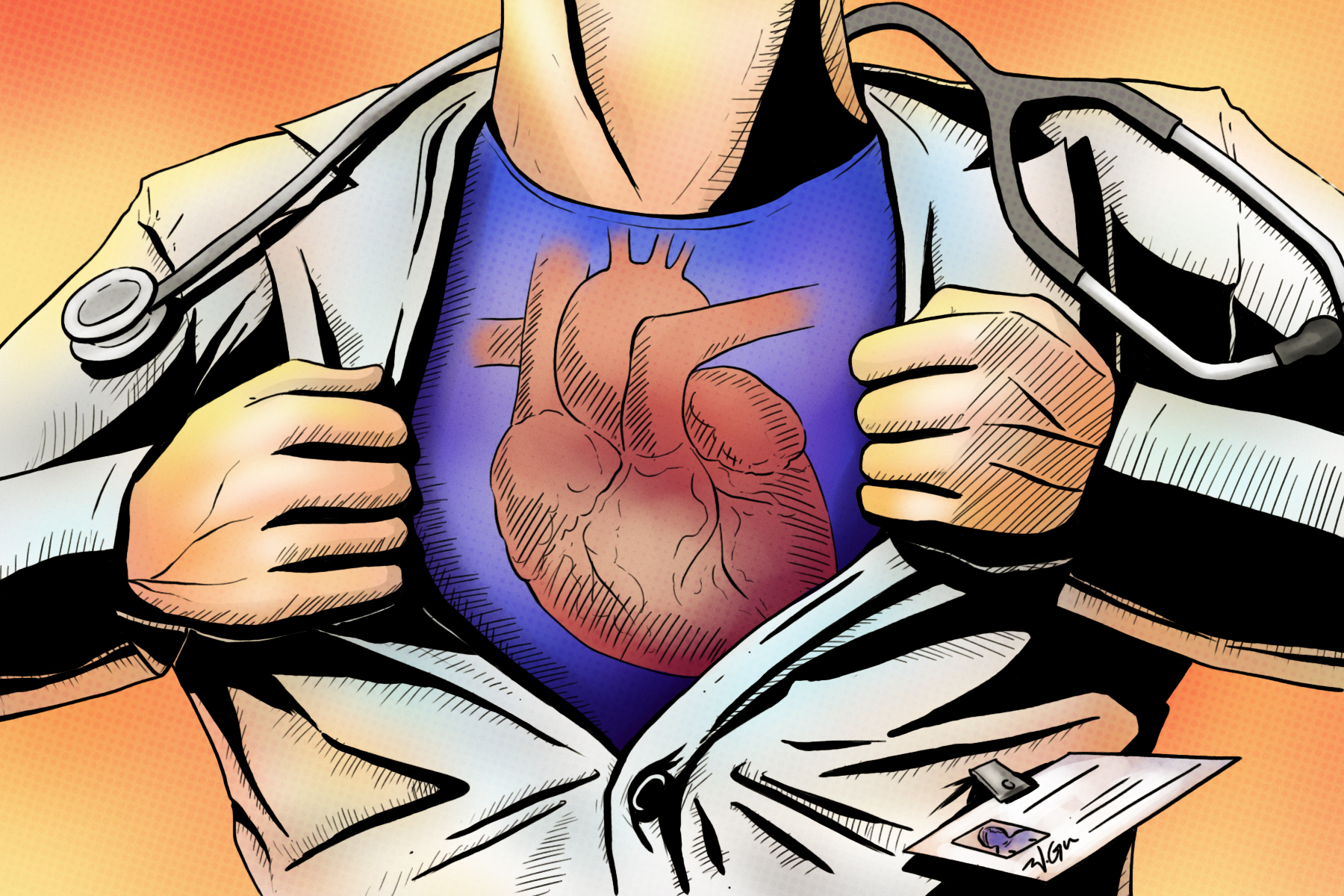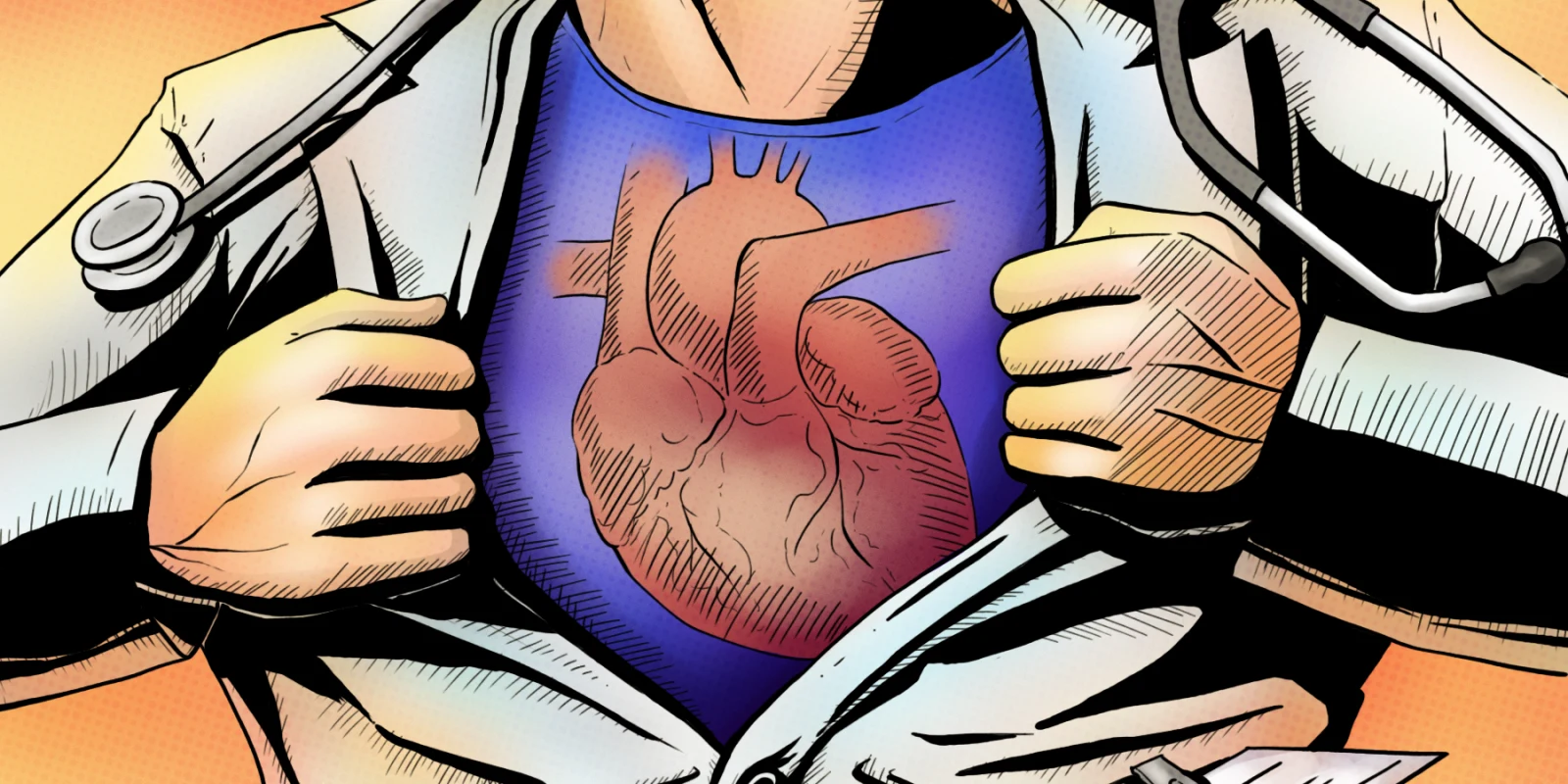 Was everyone in med school as young, innocent, and wildly stupid as we were? When we were enrolled at Johns Hopkins University School of Medicine, we wanted superlatives: most, best, fastest … dumbest? Before each test, my friend Frank and I would scroll through our personal Rolodexes of study alternatives (who wants to be stuck inside with Clinical Microbiology Made Ridiculously Simple?). I preferred the morbid: eating so many McDonald’s cheeseburgers that we gave ourselves tiny heart attacks; getting hit by a car, but only enough to say, cast a limb. All of my ideas would (theoretically) prevent us from sitting for this specific test and shock us into appreciating our young and healthy lives, which we were regularly neglecting in damp libraries.
Was everyone in med school as young, innocent, and wildly stupid as we were? When we were enrolled at Johns Hopkins University School of Medicine, we wanted superlatives: most, best, fastest … dumbest? Before each test, my friend Frank and I would scroll through our personal Rolodexes of study alternatives (who wants to be stuck inside with Clinical Microbiology Made Ridiculously Simple?). I preferred the morbid: eating so many McDonald’s cheeseburgers that we gave ourselves tiny heart attacks; getting hit by a car, but only enough to say, cast a limb. All of my ideas would (theoretically) prevent us from sitting for this specific test and shock us into appreciating our young and healthy lives, which we were regularly neglecting in damp libraries.
Frank preferred the practical: jaywalking in front of a police car, pulling the fire alarm in the med school dorm — all of which would (somehow) land us in jail (which, clearly, we knew nothing about), thereby forcing us to commit to studying for 24-hour blocks of time, which was what was required to pass immunology.
In these ridiculous scenarios, we would escape relatively unharmed, just in time to get a perfect score on our makeup test (that’s the only part I knew was realistic: we would be forced to do a makeup test, no matter the circumstances that produced our absences).
Even before med school, we’d been preparing for captivity. Then, we simply gave away our freedom. At my women’s college, the Signature Ball was an annual event; while others dressed up, drank, and danced, I spent time with my partner, alone and unsupervised in my room. My boyfriend, you see, lived on campus with me. His name was p-chem: physical chemistry. (I should mention that Frank, judging by his permanently startled look during med school orientation, presumably had a similar experience at Yale, and given the grandness associated with that institution, it’s safe to assume his high school experience was similar).
We repeated this form of social distancing for decades: 100-hour weeks in-house neurosurgery residency; 30-hour continuous in-house-call fellowship. Frank became a professor at another grand university; I returned to my hometown and founded its first-ever ICU. We both married co-residents from our respective programs; we both did minimal wedding planning.
All of this, of course, was before we’d learned what captivity truly meant.
Today, doctors are experiencing a new version of captivity that really isn’t all that different. COVID-19 is sequestering us to either home or the hospital — that narrow rhythm of residency, revisisted. In popular news media, Frank, and individuals like him, are rightly being called heroes, captains fighting a viral warlord, operating on emergency cases even if it means infection during a global pandemic. We are acknowledging these individuals as heroes now — but their heroism is not new. It’s been there all along, unnoticed, every single day.
Physicians are not overnight heroes; they are not showing up in the nick of time to save the day. Physicians are the heroes of ten thousand days. They have sacrificed at every moment of their lives — every friend’s wedding slept through; every Christmas spent under the fluorescent OR lights; every breakup with someone who couldn’t understand why the hospital always, always, always won. They took call when they had a double pneumonia (sneaking in ICU breathing treatments between consults); they were told they were “glorified nurses” by patients wanting to speak to the “real doctor;” they missed their child’s first Easter; they miscarried during morning rounds.
Before COVID-19, they left interactions wondering, Did that TB patient cough on me? Did the needle pierce my skin during the Hep C paracentesis? There were thousands of sleepless nights spent wondering: Did I make the right call today?
Physicians will find these anecdotes mundane; they’ll recognize them immediately as ordinary.
But it’s important to realize, silent heroism is not ordinary. It so extraordinary. These were the times of silent heroism. Showing up every day, facing each day with tenacity, repeated over ten thousand obstacles — that’s extraordinary.
Today, the obstacle is life-threatening, to patients and to physicians themselves, and we are rightfully acknowledging the sacrifice represented by intubating someone aerosolizing COVID-19 virus inches away from your face. But I hope that in this pandemic, we also remember the thousandsof sacrifices that came before. And when, God willing, we come out from this spectre of uncertainty and fear, I hope that physicians are remembered — not for being heroes of the pandemic, but for being the heroes of our ordinary days.
Before COVID-19, medicine was experiencing a crisis of confidence. Doctors were asking things like: Is it worth it? Is it wort giving up my youth, my normal life, to be sued frivolously? Is it worth it to train for 10 thousand hours only to be treated by the government as replaceable? Is it worth it to work for a hospital system that sees doctors as bottom lines?
Today, I look back fondly at the foolish innocence of med school, when the biggest problems were our test scores. We didn’t know it then, but the test were exercises in tenacity, isolation, repetition — they were preparation for the essence of our careers. We joked about the obstacles in order to endure them, but the sacrifices were very real.
So, to those who have always done it, and who continue to do it now, even at their own risk: thank you for the daily heroism of showing up.
Happy Doctor’s Day, now and always.
Previously published on KevinMD.
Click here to see more perspectives on COVID-19 from the Doximity network.
Click here for up-to-date news about COVID-19 on Doximity.
Illustration by Wendy Gu







